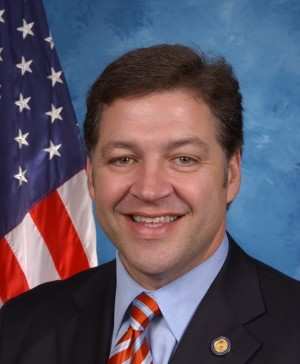Tue, Apr 23, 2013
Says Agency's Management Of Sequestration Cuts Is Politically Motivated
The announced breakdown of the five percent cut in the budget of the FAA due to sequestration hasn't been particularly well accepted by several people, among them the chair of the House Transportation Committee which oversees the agency.

The chair of that committee, Congressman Bill Shuster (R-PA) (pictured), issued a strongly-worded statement Friday after DOT Secretary Ray LaHood and FAA Administrator Michael Huerta announced that the five percent budget reduction due to sequestration would result in the furloughing of thousands of air traffic controllers and potentially disrupt the travel plans of the flying public.
“The FAA’s management of sequestration is quickly going from bad to worse," Shuster said. "Given that the FAA’s budget increased more than 100 percent over the last 15 years, finding five percent in savings shouldn’t need to significantly impact our nation’s aviation operations. Businesses and families across the country face these issues in their budgets every day without massive impacts. We know that the FAA has the flexibility to reduce costs elsewhere, such as contracts, travel, supplies, and consultants, or to apply furloughs in a manner that better protects the most critical air traffic control facilities. Yet rather than take this approach, the Administration has made choices that appear designed to have the greatest possible impact on the traveling public."
According to Shuster, there are $2.7 billion in non-personnel Operations costs that should be examined before FAA personnel are furloughed. Operations covers both personnel costs AND non-personnel costs – such as contracts, travel, supplies, and consultants. Examples of non-personnel costs include nearly $500 million for consultants, and $325 million in supplies and travel. In addition, the FAA has 46 aircraft that cost $143 million to operate.
“What’s perhaps most troubling is that the FAA has known about the sequester for almost two years and gave Congress and the airline industry less than a week’s notice about its implementation plans. This disregard for the American public is indicative that the Administration views the sequester as an attempt to score political points rather than address real issues and find real savings in a bloated federal bureaucracy.”
More News
He Attempted To Restart The Engine Three Times. On The Third Restart Attempt, He Noticed That Flames Were Coming Out From The Right Wing Near The Fuel Cap Analysis: The pilot repor>[...]
Make Sure You NEVER Miss A New Story From Aero-News Network Do you ever feel like you never see posts from a certain person or page on Facebook or Instagram? Here’s how you c>[...]
From 2009 (YouTube Edition): Leading Air Show Performers Give Their Best Advice for Newcomers On December 6th through December 9th, the Paris Las Vegas Hotel hosted over 1,500 air >[...]
Aero Linx: NASA ASRS ASRS captures confidential reports, analyzes the resulting aviation safety data, and disseminates vital information to the aviation community. The ASRS is an i>[...]
“For our inaugural Pylon Racing Seminar in Roswell, we were thrilled to certify 60 pilots across our six closed-course pylon race classes. Not only did this year’s PRS >[...]
 NTSB Final Report: Rutan Long-EZ
NTSB Final Report: Rutan Long-EZ ANN FAQ: Turn On Post Notifications
ANN FAQ: Turn On Post Notifications Classic Aero-TV: ICAS Perspectives - Advice for New Air Show Performers
Classic Aero-TV: ICAS Perspectives - Advice for New Air Show Performers ANN's Daily Aero-Linx (06.28.25)
ANN's Daily Aero-Linx (06.28.25) Aero-News: Quote of the Day (06.28.25)
Aero-News: Quote of the Day (06.28.25)



